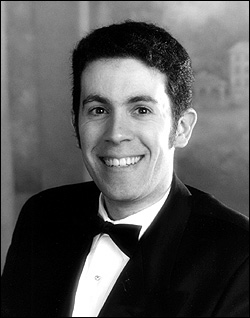In 1983, Toronto’s Canadian Opera Company staged Strauss’ Elektra with a controversial innovation: Projected on a little screen above the stage was an English translation of the German words as they were sung. Inspired by foreign film subtitles, it was an idea so obvious you wonder why no one had thought of it earlier. In the audience, just about to begin his tenure as Seattle Opera’s general director, was Speight Jenkins.
“Within five minutes,” reports SO education associate Jonathan Dean, “he said, ‘This is the future.'”
The next year, with its production of Tannhäuser, SO became a pioneer of this new technology; partly as a result, Seattle boasts the highest per-capita opera attendance of any city in America. Since 1995, the responsibility for running or writing the titles has been Dean’s. I sat down with him recently to chat about this arcane art.
Seattle Weekly: How did SO decide to start writing its own titles rather than renting them from other companies?
Jonathan Dean: The technology changed. In ’96, we started doing them on PowerPoint. When they started, it was slides. . . . For Tannhäuser, there are still title slides that turn up in drawers in the office. You’re talking about thousands of slides, piles of carousels. [Now] you can take your laptop down into rehearsals and actually look at it: “Oh, these words need to be over on the left side of the screen because that character’s standing stage left.”
What is your approach to writing titles? Do you study other translations?
My process [for The Tales of Hoffmann, which runs through Sun., May 22, at McCaw Hall; 206-389-7676] is to sit down with a printout of all the words in French and go over those word by word; if there are any hard words, I sit down with a native speaker. I just put the French into PowerPoint and divide it up to get a kind of rough cut of the titles—[determining] over which sung words we’ll probably have a title. Then I [go] over with the designer and director to decide what the concept’s going to be: Am I going to be telling the kind of story that they want me to tell?
Which languages can you translate?
I’ve done [SO productions] in German, French, and Italian but not Spanish, Russian, or Czech . . . and yes, we always title operas [written] in English, too. The rhythm is slightly different, since the titles are more of a “safety net”—hopefully people will understand the sung words, look up, and think, “Oh, yeah, that’s what I thought she sang.”
How do you time the titles with the singing?
The single biggest mistake [is to] put the words up at the beginning of the musical phrase. . . . By the time the singer gets to the second note, the audience has already read the line and is already waiting for something else to happen in the story, and it’s not going to for maybe 20 seconds. The goal is to put the title up so that the audience reads the most important word in the title more or less at the time the singer sings it. The one time you absolutely can’t break this rule is in a comedy—if you get them laughing before the singer has said the punch line, they think, “They’re not paying attention to me. . . . ” If you do it in the right way, and if the singers are doing their work properly, the audience actually does get the joke as if it were in English.
Give us your favorite snafu.
Silliest titles mishap of all time: Mimì was dying at the end of Act IV of La Bohème and dying and dying . . . and suddenly we get a big message flashing on the proscenium above the titles screen: “WARNING: Your lamp is approaching the end of its life. Please replace with a XJF-5000 model bulb,” or words to that effect. Big laugh from the crowd. Then, Musetta leans over the prop lamp onstage and sings, “You need to protect the flame or it will go out.” Even bigger laugh. D’oh.







